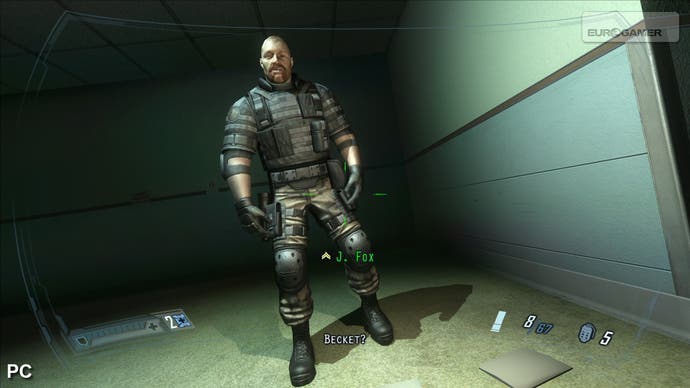F.E.A.R. 2: Project Origin Triple-Format Face-Off
Things that go bump-mapping in the night.
PC Domination
Perhaps not surprisingly, considering both the developer and the heritage of the franchise, F.E.A.R. 2 is a game best played on PC. Even though the default settings do feel rather odd (in terms of key bindings and a massively over-reactive mouse response) there is simply nothing that can touch the precision and accuracy of the mouse/keyboard combo once things are set up to your liking. The console versions' reliance on the slow-motion mode for quick kills is swiftly removed when given an interface that easily allows you to point your gun exactly where you actually want it.
But the difference between F.E.A.R. 2 console and its PC brother goes beyond just the controls; it's also about the performance. The Xbox 360 version does well to run at a fairly solid 30fps at a native 720p resolution, but even with an entry-level enthusiast PC, you'll be getting the full-fat 60 frames at anything up to 1920x1200. We tested the game on a quad-core system with three different graphics cards, and also tried out a couple of CPU downclocking options in order to emulate less powerful systems.
Sapphire's new 1GB 'Toxic' Edition of the HD 4870 not surprisingly ran the whole thing without a hitch. Overclocked as standard, this GBP 200 GPU has mercilessly consumed pretty much every game we've thrown at it so far, and as you might imagine, it made very short work of F.E.A.R. 2. However, swapping in its little brother - a 512MB HD 4830 costing half as much - yielded very, very close performance. An 8800GT sourced for just GBP 51 last month on eBay performed likewise, and closing down two of the four cores of the Q6600 CPU (effectively turning it into a lower-end Core 2 Duo) again had very little impact on performance. This amount of wriggle room suggests that if you played the game at 720p (which still looks superb, by the way), even a lower-spec GPU would still provide console-beating visuals and frame rate.
As it is, the PC version's superior looks aren't limited to more pixels and a consistently higher refresh rate - textures have more detail, there are more light sources, and shadows are more realistic and complex. Motion blur is supported on all versions, but on PC, where movement is that much faster it just makes much more sense, and has much more of an impact.
PC Renaissance
It seems that a combination of developers targeting consoles first and foremost, combined with the generally falling cost of PC components is serving to make the platform extremely enticing once more for enthusiast gamers who want the best performance - and in many games, a relatively inexpensive investment can give you a gameplay experience massively improved over console. In the case of F.E.A.R. 2 it elevates all of the core aspects that are fun on 360 and transforms the whole game into a richer, more enjoyable experience.

For both PlayStation 3 and Xbox 360 owners, F.E.A.R. 2 is something of a miss. For owners of Sony's box, it's pretty much a write-off, not just because of the very poor performance issues, but because it arrives in the same time period as Killzone 2 - a game I've spent a lot of time with recently and is perhaps the most magnificent technical achievement I've seen on the current generation of consoles. In every sense that matters, Guerrilla Games' effort serves to make F.E.A.R. 2 an almost completely redundant release for PS3 players.
For Xbox 360 gamers, things aren't quite so clear cut, because while it's hardly the greatest first-person shooter on the system and certainly lacks a degree of innovation, there is much to like about F.E.A.R. 2. While the AI isn't as advanced as Killzone's, it still provides a decent enough challenge, and once you get out of the moribund hospital environment it's clearly a pretty handsome game. Uninspiring it may be, but it's solid. So, to quote joyfully and without shame from my dog-eared manual of '90s games journalism clichés, I'd say that it's 'recommended to fans of the genre'.


